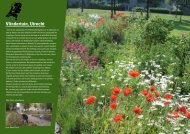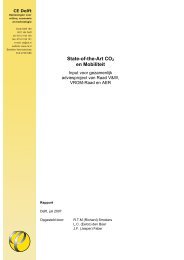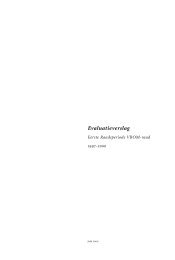Landbouw en landgebruik in internationaal perspectief Voorwoord
Landbouw en landgebruik in internationaal perspectief Voorwoord
Landbouw en landgebruik in internationaal perspectief Voorwoord
You also want an ePaper? Increase the reach of your titles
YUMPU automatically turns print PDFs into web optimized ePapers that Google loves.
6. Group session - governance<br />
Rob Cooke, José Lima Santos and Kar<strong>in</strong> Rob<strong>in</strong>et<br />
Governance is the c<strong>en</strong>tral chall<strong>en</strong>ge <strong>in</strong> policy <strong>in</strong>tegration and the upcom<strong>in</strong>g key question is<br />
how to handle long-term pressures. Instrum<strong>en</strong>ts to promote <strong>in</strong>tegration are already available,<br />
such as <strong>in</strong>c<strong>en</strong>tives, <strong>in</strong>stitution build<strong>in</strong>g, contracts and paym<strong>en</strong>ts for <strong>en</strong>vironm<strong>en</strong>tal<br />
performance. This was a broad rang<strong>in</strong>g and very <strong>in</strong>formative group discussion, with examples<br />
from several countries. The group thought that land use should explicitly <strong>in</strong>clude both<br />
urbanisation and sea use (where governance issues are particularly chall<strong>en</strong>g<strong>in</strong>g because<br />
<strong>in</strong>ternational cooperation is needed). This was because pressures from these two <strong>en</strong>vironm<strong>en</strong>ts<br />
can help to mitigate or to <strong>in</strong>crease the pressures on rural land. It was recognised that not all<br />
land is equally productive, and productivity is not always the same as fertility. The group<br />
discussed how differ<strong>en</strong>t methods of land assessm<strong>en</strong>t could be <strong>in</strong>tegrated, for example through<br />
GIS mapp<strong>in</strong>g, and questioned whether there is <strong>in</strong> fact any real risk of land abandonm<strong>en</strong>t <strong>in</strong><br />
Europe.<br />
The group discussed the follow<strong>in</strong>g specific governance issues:<br />
the importance of develop<strong>in</strong>g an ecological approach to plann<strong>in</strong>g, monitor<strong>in</strong>g and report<strong>in</strong>g;<br />
the importance of both scale and temporal issues <strong>in</strong> landscape plann<strong>in</strong>g, and also <strong>in</strong><br />
economic forces;<br />
most plann<strong>in</strong>g systems are about cons<strong>en</strong>t<strong>in</strong>g to operations, rather than <strong>en</strong>courag<strong>in</strong>g<br />
particular activities;<br />
broad-scale approaches are oft<strong>en</strong> used, but these can be crude. However, more s<strong>en</strong>sitive<br />
approaches oft<strong>en</strong> have high transaction costs;<br />
ecosystem based approaches would be helpful;<br />
performance based approaches can <strong>en</strong>courage <strong>in</strong>novation.<br />
The key issue that we need to understand is what, if any, trade-offs there are betwe<strong>en</strong> food<br />
production and land use impact. We need to be able to measure and assess impacts, and take a<br />
consist<strong>en</strong>t approach to their evaluation. This would help determ<strong>in</strong>e what an appropriate level<br />
of trade-off might be, or conversely what opportunities there are for synergy.


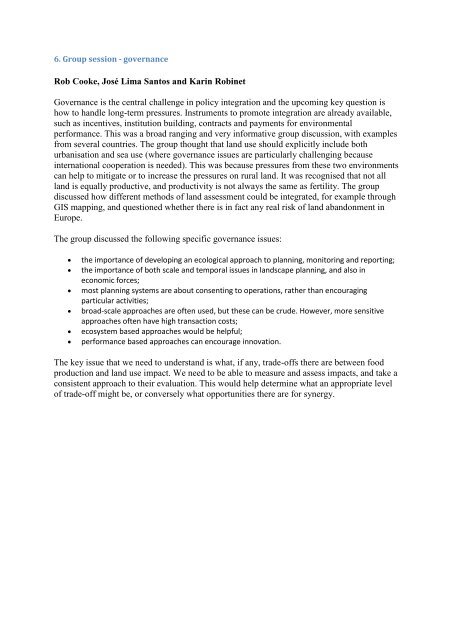
!['Zwaveldioxide en zwaveltrioxide' [pdf] - Raad voor de leefomgeving ...](https://img.yumpu.com/20578080/1/184x260/zwaveldioxide-en-zwaveltrioxide-pdf-raad-voor-de-leefomgeving-.jpg?quality=85)
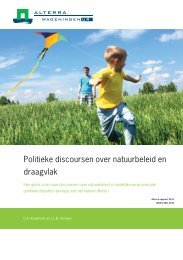
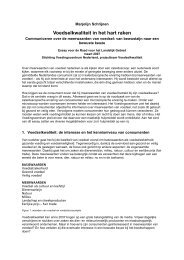
!['Ammoniak als koudemiddel' [pdf] - Raad voor de leefomgeving en ...](https://img.yumpu.com/20336041/1/184x260/ammoniak-als-koudemiddel-pdf-raad-voor-de-leefomgeving-en-.jpg?quality=85)
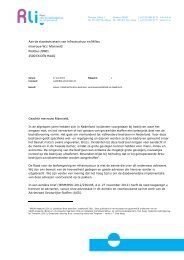
!['Reacties uit het veld' [pdf]](https://img.yumpu.com/20207000/1/184x260/reacties-uit-het-veld-pdf.jpg?quality=85)

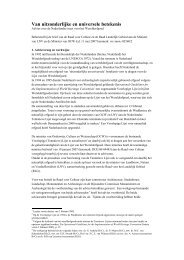
![Download het volledige advies 'Ruimte voor duurzame landbouw' [pdf]](https://img.yumpu.com/19986529/1/188x260/download-het-volledige-advies-ruimte-voor-duurzame-landbouw-pdf.jpg?quality=85)
